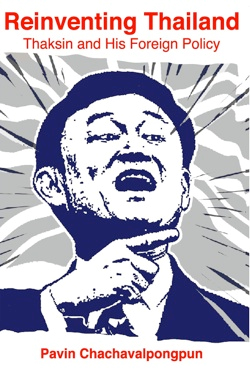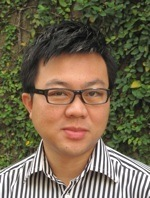 Pavin Chachavalpongpun, Thailand
Pavin Chachavalpongpun, Thailand
Lead Researcher, Institute of Southeast Asian Studies
Regional Strategic and Political Studies, and ASEAN Studies Centre, Singapore
Public Policy Program (’97)
Pavin Chachavalpongpun is currently the Lead Researcher for Political and Strategic Affairs of the ASEAN Studies Centre at the Institute of Southeast Asian Studies (ISEAS), Singapore. Before joining ISEAS, he served in the Thai Foreign Service in various capacities for 16 years, most recently at the Royal Thai Embassy in Singapore.
While working for the Ministry of Foreign Affairs, Pavin was granted study leave and came to Japan in 1995. He received his Master of Public Policy from GRIPS’ predecessor, the Graduate School of Policy Science (GSPS) in Saitama in 1997. Upon graduation from GSPS, Pavin moved to the United Kingdom to pursue further studies at the School of Oriental and African Studies (SOAS), University of London. He obtained his Ph.D. from SOAS in 2002 with a dissertation on Thai-Burmese relations.
Pavin has written widely on Thai politics, foreign policy and international relations, among others, in journals and newspapers. He is the author of A Plastic Nation: The Curse of Thainess in Thai-Burmese Relations (2005), and Reinventing Thailand: Thaksin Shinawatra and His Foreign Policy (ISEAS, 2010). Pavin has also written extensively on Myanmar issues and co-authored “Myanmar: Life After Nargis” (ISEAS, 2009).
What is your area of specialization and how did you come to work in this area?
My area of specialisation is in foreign policy analysis. I am also interested in the issue of Thai politics, international relations among mainland Southeast Asian states as well as political development in Myanmar. I have always had a keen interest in politics and diplomacy and this explained why I chose to study political science and international relations, first at Chulalongkorn University (Thailand), then Saitama and also at the School of Oriental and African Studies (SOAS).
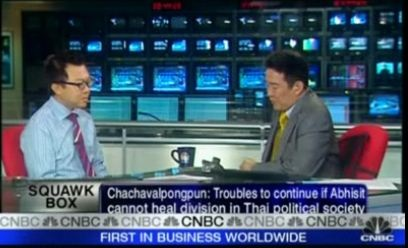
You served in the Thai Diplomatic Service for about 15 years but then quit and switched to academia and journalism. What triggered your career move?
In fact, I had been with the Thai Foreign Service for 16 years. Through the years and especially after I earned my PhD in 2002, I realised that I have become interested in the academic world which gives me more freedom in my analysis and writing. I was also caught in between serving in the government and having to criticise some of the government’s policies with which I disagreed. I believe that, with my PhD, I could contribute more to the world of Thai studies. I think I really like conducting research and also teaching.
You are currently a fellow at the Institute of Southeast Asian Studies in Singapore. What attracts you most about academia? What are your (research) interests and what would you like to achieve?
I think it offers you freedom of expression, allowing you to challenge yourself intellectually and to see things more cynically. My research interest has focused on the Thai political crisis which has long persisted since the military coup of September 2006. Now that I am out of the government service, I can look at the situation and examine it without prejudice. I hope to be able to bring some new thoughts on the Thai crisis, using my local knowledge to explain the situation better, especially to the outsiders.
You just published a book “Reinventing Thailand: Thaksin and his Foreign Policy “, a critical account of former prime-minister Thaksin Shinawatra’s foreign policy. What is your main message and how has your book been received in so far Thailand? And abroad?
Here is the key message: From 2001 to 2006, Prime Minister Thaksin Shinawatra transformed Thailand’s international role from one of obscurity into a kind of regional hegemon. Thaksin’s diplomatic ambitions were reflected in his myriad of grandiose foreign policy initiatives, designed to locate Thailand at the forefront of regional politics and reinstall the Thai sphere of influence over weaker neighbouring states. He abolished the traditional bending-with-the-wind foreign policy, revamped the Thai Foreign Ministry, and empowered Thai envoys through the CEO Ambassadors programme. But in this process, Thaksin was accused of exploiting foreign policy to enrich his business empire. Thaksin’s reinvention of Thailand as an up-and-coming regional power was therefore tainted by conflicts of interest and the absence of ethical principles in the country’s foreign policy.
The book has been well received both in Thailand and abroad. I have launched my book at various locations, in Thailand and in many countries in Southeast and East Asia. I am pleased with the outcome. Most readers seemed to agree with me that there were many problems with Thaksin’s foreign policy. Some of these problems can still be seen today.
You also write regularly for the Bangkok Post and other newspapers and have been quite outspoken and critical about Thai politics, internet censorship and the monarchy, even while you were still in MOFA. I can imagine the controversy this caused. Is that one of the reasons why you prefer to live and work outside Thailand?
I think the space for expression in Thailand is shrinking. The current Abhisit government does not seem to enthusiastically support free thought on Thai politics. Living in Singapore allows me to challenge such rule laid by the Thai state. It also allows you to be far (enough) from the problem and perhaps see things more clearly. I always believe in critical debates because they promote new initiative as well as the courage against conventional thinking.
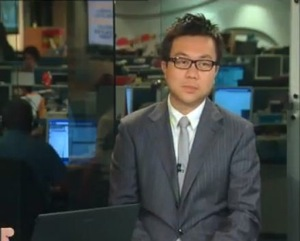
Some people fear that Thailand has been irrevocably damaged after the recent political unrest. Are you optimistic about the future of Thailand? What do you see as the main challenges and the best way forward for the country?
I am ambivalent about the whole Thai crisis. Pessimistically, I think it will take a long while before Thailand can be back on track. This is because the traditional elite are still refusing to let go of their domination of power, while residents in the rural areas are demanding a fairer share of political power and national wealth. Optimistically however, the current tug of war between the two opposing camps, mostly demonstrated through the yellow and red-shirted movements, could lead Thailand into a new political landscape; where people know their rights and want the exercise them. As for what would be the best way forward for Thailand? I would say that a new political consensus needs to be discovered. Once found, all political parties and factions will have to respect it.
What are some of the biggest challenges you face in your work and what has been the most rewarding aspect of your career thus far?
One of the biggest challenges is to remain true to my belief/analysis and not to become intimidated by those (particularly in the government) who may disagree with you. The support I have received so far from those who have followed my works is very encouraging. The most rewarding aspect of my career so far is to complete two books and many chapters, articles, monographs, etc.
How did your experience at GRIPS/GSPS help you in your career?
Life in Saitama in 1995 was tough. I did not know Japanese and at the time refused to learn it. In looking back however, I gained many experiences from my study at GRIPS/GSPS. It was the Japanese way of thinking that has inspired me in many ways in my career (especially positive/innovative thinking). Japanese senseis are kind, unlike some of my professors in the UK ;-) GRIPS/GSPS successfully built a strong foundation for me to continue my doctorate study and to tackle issues more systematically and analytically.
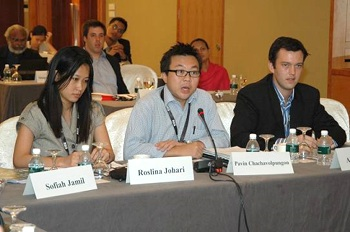
What was the most important thing you learned while here?
Education is a bridge to success. The fact that I was a recipient of a Japanese scholarship made me realise that education is precious and a passport to a great opportunities in life.
What is your fondest memory of your time spent at GRIPS/GSPS?
Having fun out of class and enjoying activities with some of the professors and classmates. I am still in touch with some of these classmates.
What do you miss about Japan?
Food. Cold weather. Heat in summer. Shabu Shabu. Vending machine. Saikyo Line.
What is your favourite thing to do when you are not working?
I like to read and just play with my dog.
What advice would you give to current GRIPS students?
Enjoy student life if you can. This period will be short and you might as well make the most out of it.





